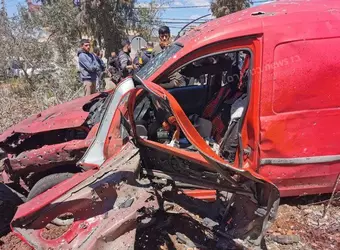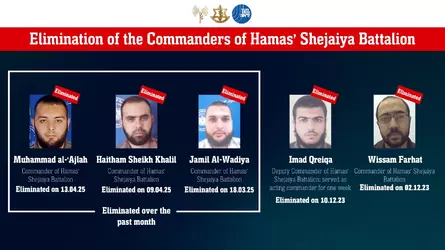Hamas is facing a new problem in Gaza: coming up with the cash it needs to pay its rank and file.
Israel last month
cut off supplies of humanitarian goods to the enclave, some of which Hamas had been seizing and selling to raise funds, according to Arab, Israeli and Western officials. Its renewed offensive has targeted and killed Hamas officials who played important roles in distributing cash to cadres and sent others into hiding, Arab intelligence officials said.
In recent weeks, the Israeli military has said it killed a money changer who was key to what it called terrorist financing for Hamas as well as a number of top political officials
in rapid succession.
The result for Hamas has been a debilitating squeeze.
Salary payments to many Gaza government employees have ceased, while many senior Hamas fighters and political staff began receiving only about half of their pay midway through last month’s Ramadan holy period, the intelligence officials said. Rank-and-file Hamas fighters’ pay had been averaging around $200 to $300 a month, they said.
The shortfalls are creating hardship across Hamas’s ranks in Gaza’s cash economy and signal a deepening organizational dysfunction in the militant group as it also contends with a more aggressive Israeli military strategy.
“Even if they sit on large amounts of cash, their ability to distribute it would be very limited right now,” said Eyal Ofer, an open-source researcher on Gaza’s economy. Ofer said Hamas’s typical payment methods were to have a courier carry cash or to set up a disbursement point, either of which could create targets for Israeli troops. “Those two things would grab attention,” he said.
Hamas didn’t respond to a request for comment on its financial position or its methods for sourcing cash.
Hamas, which controls Gaza’s civilian government, got monthly cash transfers of $15 million from Qatar before the war. It also
has raised funds from places including western Africa, South Asia and the U.K., building up a stockpile of some $500 million, much of it in Turkey, according to Western and Arab officials.
Once the war started, Israel tightly limited the transfer of physical cash into Gaza, forcing U.S.-designated terrorist group Hamas to find ways around the restrictions. Early on, the group was involved in taking $180 million from branches of the
Bank of Palestine and other institutions, current and former Palestinian officials said.
Hamas used the flow of humanitarian and commercial goods to build new income streams, according to Arab, Israeli and Western officials. This has included charging taxes on merchants, collecting customs on trucks at checkpoints, and commandeering goods for resale. Hamas also has used overseas cash to buy humanitarian goods that are then sold in Gaza and turned back into cash, the officials said.
Even with these workarounds, Hamas was nearing a liquidity crisis before the January cease-fire brought an influx of aid into Gaza, giving the group a chance to refill its coffers, the Israeli and Western officials said. Those pathways closed when Israel sealed Gaza’s borders to humanitarian supplies in March.
“There is a big crisis in Hamas in terms of getting the money,” said Moumen Al-Natour, a Palestinian lawyer from the Al-Shati refugee camp, in central Gaza. Natour, who has been part of a burgeoning opposition movement to Hamas’s rule, said the group was struggling to pay Hamas-affiliated government employees. “They were mainly dependent on humanitarian aid sold in black markets for cash.”
Aid organizations have criticized the cutoff, saying it risks bringing extreme hunger back to the enclave’s two million residents. Israeli Defense Minister Israel Katz said Sunday that blocking aid undermines Hamas’s control and said this week that Israel is working on a new plan to distribute aid through civilian partners.
Hamas’s ability to generate income via aid has been so significant that Israel is re-evaluating its screening process for future shipments. In the past, it focused on blocking goods it thought presented security risks. Now, the military is considering added scrutiny even for permitted goods if they could have high economic value to Hamas, an Israeli official said.
During the cease-fire, Hamas set up distribution points for salary collection, paying people in cash or at times with goods, the Arab intelligence officials said. After Israel resumed its attacks in March, disbursement shifted to person-to-person networks, as much of the group went into hiding.
The reduced payments are making it harder for Hamas to bring in new recruits and maintain cohesion as Israel
seizes more land and Gazans mount a rare spate of
protests against Hamas for failing to end the war.
The broader cash crunch is compounding the stress on civilians in Gaza, where Israel’s currency is legal tender. Displaced Gazans who have to search for food, shelter or medicine in the shattered enclave also need to scramble for the cash to pay for it.
Israel’s central bank routinely refreshed Gaza’s supply of physical shekels ahead of the war, but Gaza hasn’t received an injection of new bills since the fighting began 18 months ago. Many of Gaza’s 56 bank branches and 91 ATMs have been
destroyed or rendered out of service over the course of the war.
Aid organizations have provided tens of millions of dollars in cash assistance to Palestinians since the war began, disbursing funds through popular electronic-payment applications, according to the Arab intelligence officials. Gazans also get remittances from family and friends abroad. But to turn that into cash, Palestinians need to pay money exchangers commissions in excess of 20%, a senior Palestinian financial official said.
No one knows exactly how much physical cash remains in Gaza, but analysts such as Ofer estimate there may be $3 billion in bills in circulation.
The cash shortage is so dire that it has created a cottage industry of money repair shops, where Palestinians physically wash the bills and patch them back together with tape, in order for them to re-enter circulation.













